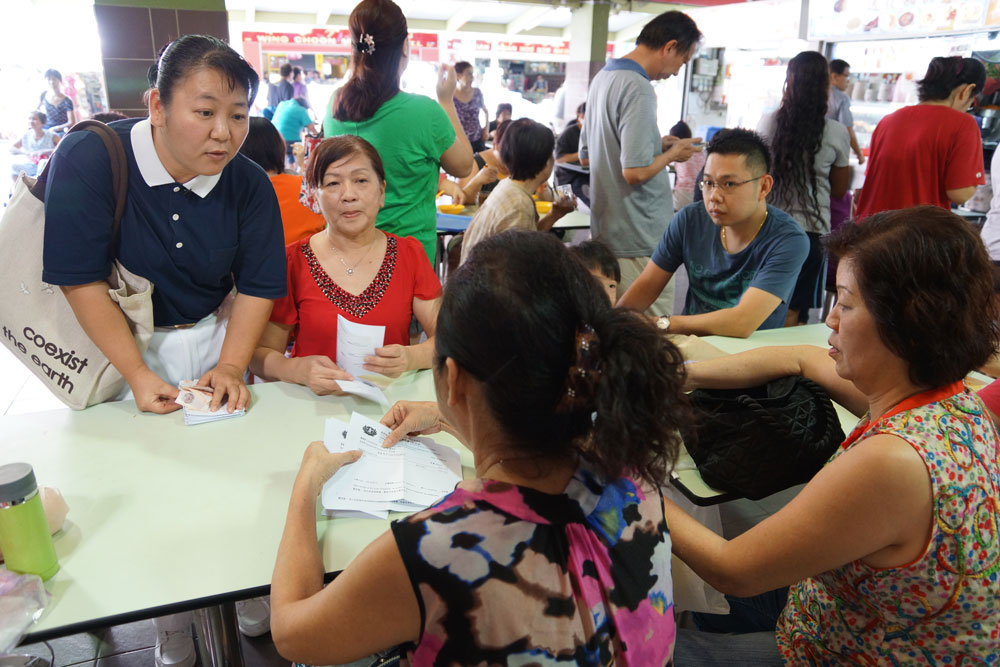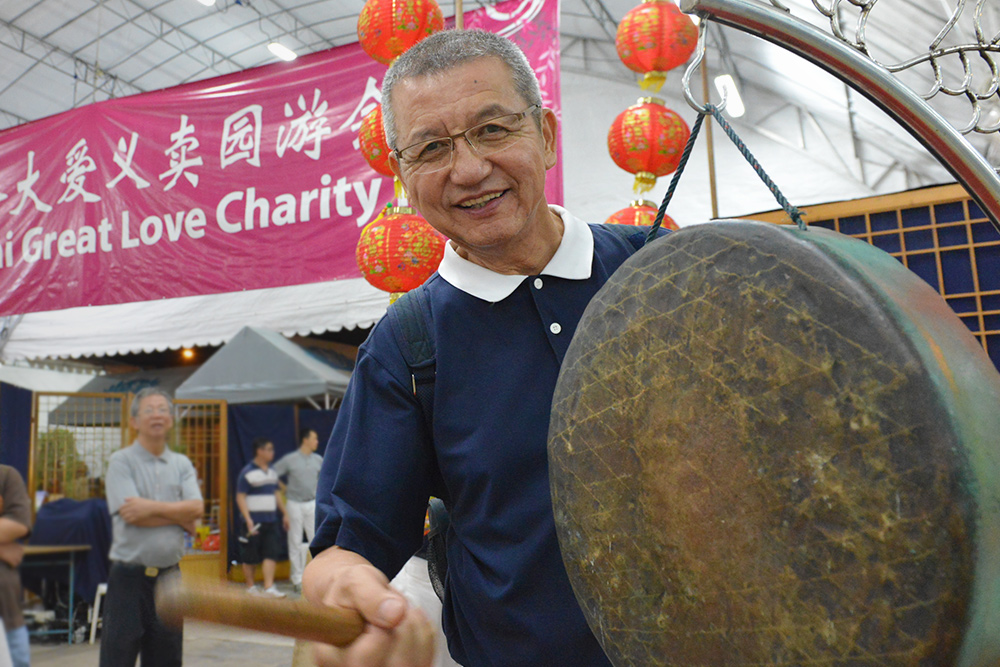
(Photo by Pang Lun Peng)
Have you ever tried talking to yourself in the mirror?
Have you ever asked yourself, “Do I like the person in the mirror?”
Once, a doctor took a patient to a room installed with eight mirrors, and they had the following conversation:
Doctor: “Who do you see?”
Patient: “I see myself.”
Doctor: “Do you like this person?”
Patient: “No.”
This patient is now a 64-year-old Tzu Chi volunteer; his name is Tan Beng Hock.
Tan was very rebellious in his younger days and would do whatever he wanted without being bothered about the outcome. In the 60’s and 70’s, gangsterism was rampant in Singapore, and Tan, being young and ignorant, became part of a gang. He was involved in many gang fights and even collected protection money. At the age of 17, he was charged for criminal offence, and then sent to a boy’s home for seven years of rehabilitation. His body was covered with tattoos, which were common on gang members as a sign of power.
Tan was eventually released from the boys’ home at the age of 24. However, even after going through years of rehabilitation and starting his own family, Tan did not change his old habits. As he showed us the photos of his children in their younger days, Tan admitted that he was unable to recognise his own children due to his constant absence from home. He was always occupied with his business and was rarely in Singapore, so his wife and children were as if non-existent to him. At that time, Tan had the perception that there was no need to look after the children because every kid would grow up naturally. He admitted that such a deluded perception had destroyed his life.
 (Photo by Pang Lun Peng)
(Photo by Pang Lun Peng)
In 2004, Tan’s second son, Guan Zheng was diagnosed with acute leukemia. His illness was so critical that he required chemotherapy and an umbilical cord blood transplant. As Tan was just an odd-job worker and his wife was a factory worker, both of them were unable to afford the hefty medical treatments for their son. Fortunately, their case was referred to Tzu Chi by the Singapore National University Hospital, and the timely assistance provided by the Foundation allowed the couple to pay the bulk of their son's medical costs.
Then, Tzu Chi volunteers started providing continued care to Guan Zheng and gave him emotional support when he was battling with cancer. During his treatment period, the boy was encouraged by the volunteers to write a diary and copy Jing Si Aphorisms. Later, Guan Zheng underwent the umbilical cord blood transplant operation, after which he stood a chance for full recovery if there was no transplant rejection. However, one year after the operation, another misfortune befell the family: One day, when Guan Zheng was crossing a road with his mother and brothers, he was knocked down by a vehicle and passed away a few days later, after sustaining serious injuries in the unfortunate accident.
Everyone is my enemy
Tan showed us the diary of his second son, Guan Zheng. If it was not because of the mentioning of his past during the interview, Tan would be reluctant to take out the item left behind by his belated son.
At that time, the sudden loss of his beloved son drove Tan into depression that lasted for three years. It was difficult for him to walk out of the agonising pain, and he was so deeply entrenched in grief that he even had the delusion that his son was still alive. Once, after he returned home, he imagined his son calling him and he even responded.
The death of his son brought deep guilt and remorse upon him, and he blamed himself for not having taken good care of the latter. At times, when he was taken over by his depression, he would vent his anger and sorrow by physically harming people around him.
Tan’s eldest son fell victim to his devastating rage. Everyone he saw at that time was an eye sore to him. He even kicked a Bangladeshi on a bicycle that rode past him, and the innocent man fell down due to Tan’s assault. Tan did not know for sure why he behaved in that way. He said that he was probably provoked by the skin colour of the man, because the driver of the vehicle that knocked down his son was an Indian.
For a long period of time, Tan kept questioning the reason for his son’s death. He was so overwhelmed with grief that he became easily agitated, and described himself as an incredibly bad-tempered man during that time.
Awakening from delusion
All the drama persisted until that fateful day when Tan attempted to beat up his eldest son again. Unable to handle the stress anymore, his wife fled to the 13th level of their block and wanted to jump down from the building. She begged Tan to let go of their eldest son and threatened that she would rather kill herself first. The heart pounding sight of his wife’s suicide attempt awakened Tan. It was only then that he realised he had to seek medical treatment for his mental conditions. Accompanied by his wife, he finally sought treatment from a psychiatrist, and his conditions were then kept under control by regular medication.
After he started seeking medical treatment, Tan also began to read Jing Si Aphorisms. The Jing Si Aphorism, “Why do people keep feeling miserable? It’s because they keep overthinking about things”, became deeply rooted in Tan’s heart, and it even served as a guiding light in his life.
One day, Tan attended Master Cheng Yen’s predawn Dharma talk for the first time, after being persistently invited by Tzu Chi volunteers to the event several times. He shared that he was clueless as to what the event was about at the beginning. Only after attending the event did he discover that it was actually a live Dharma talk by Master Cheng Yen, which was broadcasted through video-conferencing.
 (Photo by Pua Poo Toong)
(Photo by Pua Poo Toong)
In 2012, Tan and his entire family participated in the “Dharma as Water” Sutra Adaptation at Tzu Chi’s Year-End Blessing Ceremony. At the time, he shared about his deep affiliation with Tzu Chi, saying that Tzu Chi not only provided funding for his son’s medical costs and family's living expenses, but also cared a lot about his children and often gave them encouragement.
“Tzu Chi volunteers never asked for anything in return, and neither did we know each other beforehand. But they not only enabled my son to treat his illness; (their care and support) also healed my heart,” said a deeply grateful Tan.
An unexpected car accident that took away the life of Tan’s precious son completely changed him and his family. He described himself as living a “foolish and chaotic life” before the age of 50. After experiencing much hardship and tribulations over the years, he now lives a settled life and operates a vegetarian food stall in a hawker centre in Jurong East. He named his stall after his second son, as a way to remember him, and sees his time spent working at the stall as wonderful moments spent with his son.
 (Photo by Pang Lun Peng)
(Photo by Pang Lun Peng)
Currently, Tan is often seen riding an electric bicycle in his yellow rubber boots, travelling to and fro between his home and the vegetarian food stall. Although he has aching legs due to long hours of standing, he feels that a stable and practical life is worth the physical pain.
Tan sincerely hopes that his life experience can serve as a lesson to people, especially the younger generation, to prevent them from taking the wrong path in life.
“Life is short. Young people should head towards the right direction. As long as they strive towards their goal with confidence and diligence, they will eventually succeed, no matter how difficult it is,” he said.
 (Photo by Lee Chia Yee)
(Photo by Lee Chia Yee)



